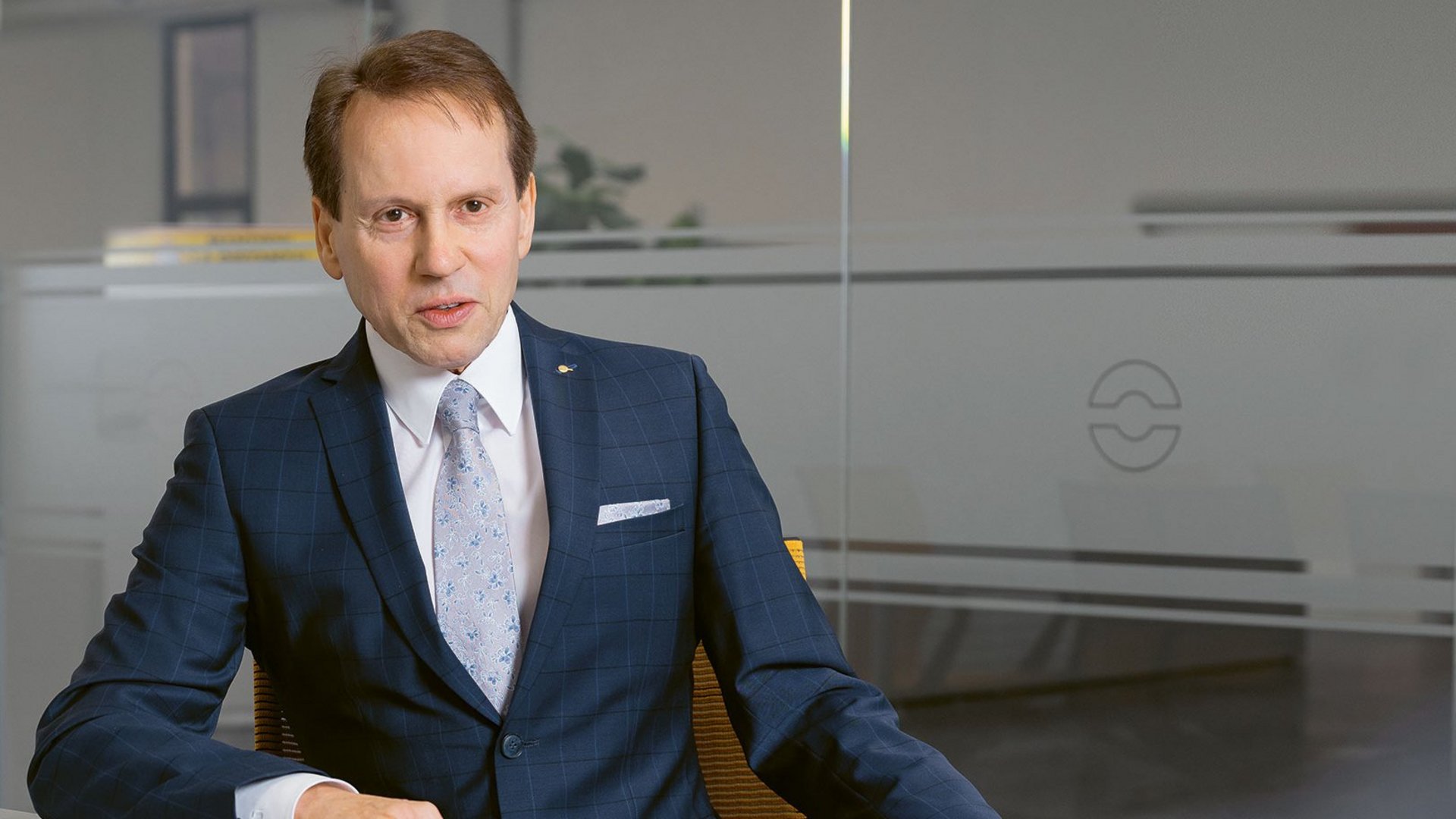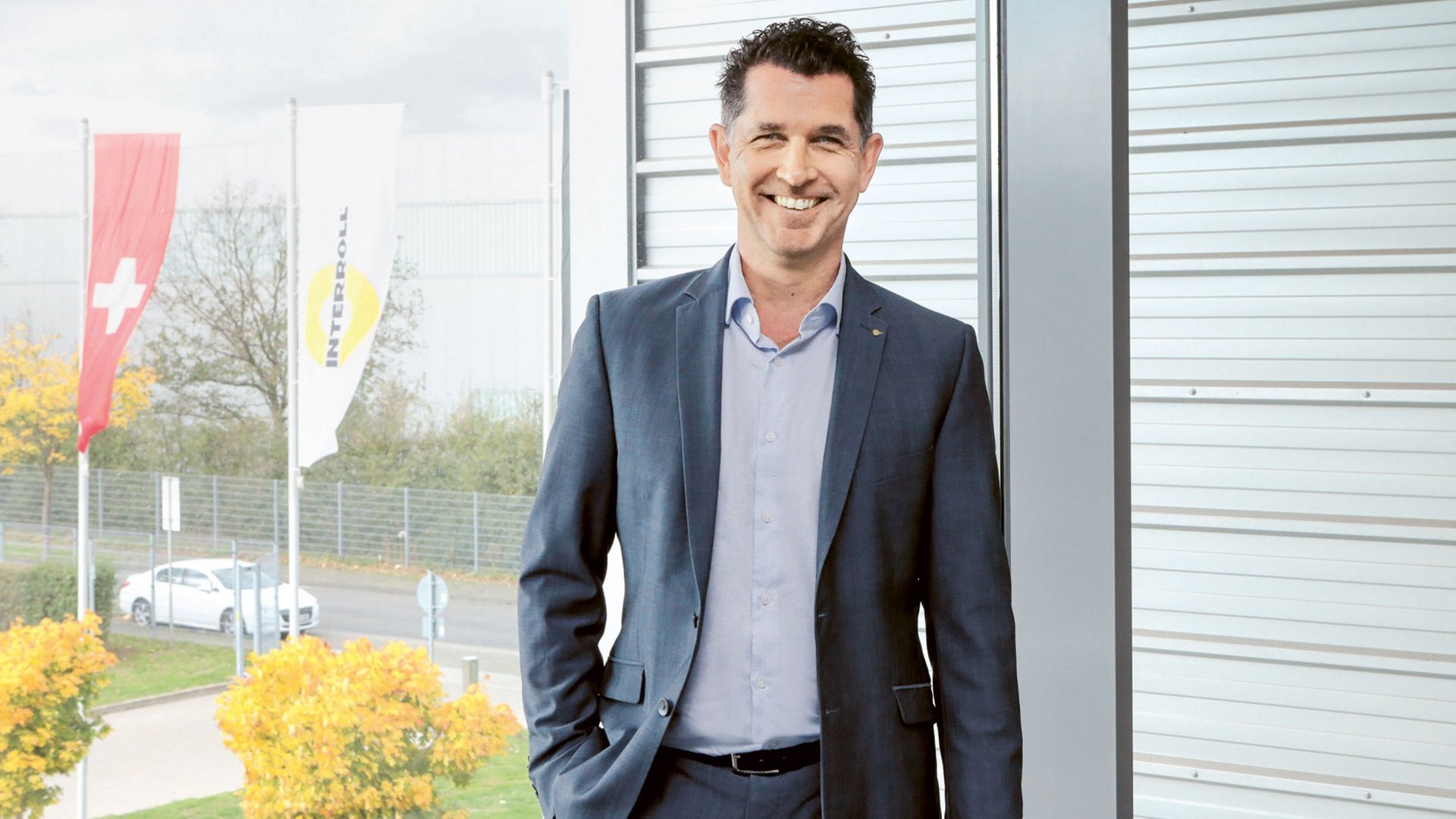“OUR FOCUS ON SAVING TIME HAS PAID OFF”
19.03.2021
Interview as PDF
Interview with Paul Zumbühl, CEO of the worldwide Interroll Group, about the financial year 2020 and Interroll’s prospects.

The year 2020 will be the last full financial year in which you have led Interroll as CEO. What is your conclusion?
Paul Zumbühl: In fiscal year 2020, we were able to reap the fruits we had sown in recent years. This relates to two things in particular: On one hand, we have constantly improved our range of services and were able to serve the market excellently in the crisis year. On the other hand, Interroll had already done its homework during less challenging years. This enabled us to focus on what is crucial for success in this particularly challenging year, 2020: our customers.
How has the focus on customers shaped up?
The customers’ response times, the so-called window of opportunity, is very short. They need partners they can rely on. Delivery capability and quality count enormously. This became even clearer during the COVID-19 pandemic. Last but not least, during the crisis our employees once again underlined that our Climate of Excellence; in other words, the culture of delivering top performance, is deeply anchored in the company. Our productivity and delivery capability were maintained at a very high level almost during the entire crisis. Interroll also won some new customers because we responded faster than competitors. Our digital processes as well as our internal decision-making channels function smoothly. Our long-standing focus on saving customers time, from planning to installation, has paid off. This has enabled us to give answers and deliver our solutions quickly.
Was the competition less well-prepared?
No, I don’t want to generalize, but we have gained new customers. Now, of course, it’s a matter of retaining customers and continuing to grow with them. Our agile, global production network with 16 sites was able to work around regional supply chain problems and compensate with alternatives elsewhere.
What has Interroll learned from the pandemic?
For me personally, this is the third crisis during my time with Interroll, after the technology bubble in 2000 and after the financial crisis in 2009. We have learned from each crisis and had already consistently implemented this knowledge in the previous years, both in terms of our strategic orientation and our cost management. The acid test has therefore been passed: In an exceptionally challenging year, Interroll was able to increase its order intake significantly in local currency and slightly in reporting currency, and even significantly improve its profitability. The lesson to be learned from the current crisis is to stay even closer to the projects. This also means being known by the customer’s customer and thus being very close to the market. We have to influence the end user’s decision-making process in terms of material flow solutions, in the future even more than we do now. Interroll has also continued to learn in the area of research and development. The strategic aspect behind our success is indeed our strong innovation. This is now having a lasting positive effect on the technology platform. Our modular solutions are in demand with customers.
“The lesson to be learned from the current crisis is to stay even closer to the projects. That also means being known by the customer’s customer and thus being very close to the market.”
About the technology platform: In 2020, there were two major innovations, both an expansion of the Modular Pallet Conveyor Platform (MPP) for pallets and the High-Performance Crossbelt Sorter (HPCS). How did these develop in the market?
The high-performance sorter opens up a new performance segment in the market, which we had not covered before. What is new is that with the HPCS we have realized a global product rollout for the first time: We launched the solution on the market worldwide at the same time. This was only possible with synchronized production and delivery capability on all three continents. We only launched the new sorter on the market in March, and yet we have already received more orders than originally expected. We are very pleased about this, but we are not letting up here: Interroll will be launching another sorter in the basic segment in 2021. By basic segment, we mean, for example, applications where manual sortation in principle is still possible or where, as in the fashion sector, reliability and speed are becoming increasingly important due to automation. Of course, there are already competitors in the market in this area. Therefore, it is important to convince customers with unique selling points.
The MPP is often compared with the Modular Conveyor Platform (MCP). Is the development in the first year on the market similar here?
In the case of the Modular Pallet Conveyor Platform (MPP), the feedback from customers has been very positive. The concept in this area is completely new, therefore it also needs more time. With 1.2 tons of conveying load capacity, the MPP is of course in a different weight class from the MCP and is new territory for us with new customers. For example, in an automated palletizing system, loading stations and robot cells, the MPP with its digital intelligence can be excellently integrated. We have merged the Dynamic Storage product group with the MPP pallet conveyors and are now tackling the subject of pallets holistically and in a modular form in the Pallet Handling product group. With our LEGO-like modular construction kit, which has now been completely expanded, the integrator can implement the material flow processes in the area of pallets quickly, safely and flexibly as well as with coordinated digital interfaces.
What is the outlook as far as further innovations are concerned?
Our performance on innovation has strengthened us significantly. Hardware and software form a complete, intelligent solution, as their differences become less increasingly indistinct.That is why we have built the innovation team much more interdisciplinary and have reorganized the processes. With the system innovation approach, we look at exactly where the customer’s pain point is and how we can eliminate it. It is important that this is understood correctly from the outset in order to generate real customer value.
The market for intralogistics has opened up to a number of innovations, for example automated guided vehicles (AGVs) and drones are becoming established. Does this pose a threat to Interroll?
We see these technologies as complementary. The aims here are to enable the right interfaces for networking and to provide intelligent conveyor technology that adapts optimally to customer requirements. In terms of costs, energy consumption, simplicity, occupational safety, and flexibility, our technology platform continues to offer decisive advantages in an increasingly digitalized world, today and in the future.
What role does digitization play here?
Digitalization is now opening up enormous opportunities to increase customer benefits. However, digitalization is a means to an end. Decentralized intelligence in material flow are important keywords, and customers can rely on Interroll’s modular control platform here. The task is to take the burden off the system integrators so that they can concentrate on the overall solution and integrate our intelligent products easily, safely and quickly.
Digitalization is now the focus of the new Center of Excellence in Linz, Austria?
As communicated at the beginning of the year, Interroll acquired MITmacher GmbH with a team of highly qualified engineers in Linz. With this team, at the new location, our new global competence center for software and electronics is now being created. Thus, we will be able to build the software platform in an even more focused modular and scalable way in the future. However, we are restricting ourselves to the machine level with the aim of further simplifying the lives of end users and system integrators and offering them plug-and-play solutions. In the medium term, this will also create major opportunities for service.

Our performance on innovation has strengthened us significantly. Hardware and software form a complete, intelligent solution, as their differences become less increasingly indistinct.”
What growth opportunities do you see in service in general?
In recent years, Interroll has been able to massively expand its installed base. Now it makes sense to further expand service. The aim here is to further increase the share of sales accounted for by service. We are tackling the issue in the medium term and want to expand our service revenue share to 20 percent in five to seven years. The newly established service organization, which we presented in February 2021, will provide significant impetus here.
What role do partnership and cooperation play in the market?
Interroll is a trendsetter in the market, an authority. This also means that we have a great responsibility. Customers trust in our technologies and innovation as well as in our sustainable financial strength – especially in times of crisis. We certainly don’t want to disappoint them. In the future, partnership-based cooperation will be further strengthened in the market. It will be less and less possible for market players to cover everything that is technically possible in the material flow on their own as the risk of losing market share is high. This is all the more true on global stage. With our Rolling On Interroll (ROI) partner program, we are clearly demonstrating how successful Interroll and its partners can be together if we use our strengths in a complementary way.
Can outsourcing play a role here?
Yes, definitely. Interroll has outstanding expertise in manufacturing products for material handling. We see great potential in customers, who want to abandon their in-house production and adopt our platform solutions. We also investigated this topic with a study in which we surveyed 300 decision-makers from manufacturing companies in the DACH (Germany, Austria and Switzerland) region. The conclusion was that there is considerable untapped potential for outsourcing in the area of production. The ability to deliver is a particular focus here: By outsourcing production and innovation processes, companies can eliminate innovation bottlenecks and inefficiencies that became apparent during the COVID-19 crisis. Incidentally, in their own perception, only about 14 percent of all companies surveyed see their production as a core competence. This is particularly surprising in the mechanical engineering sector. For us, this means potential in the market that promises further business opportunities in addition to innovations.
How optimistic are you about further growth?
We are investing a total of 150 million Swiss francs on all continents in the period 2020–2022, in innovation, digitalization and our production capacities. In this way, we are investing in our further growth. The most important thing is to be able to deliver at all times. The COVID-19 crisis has mercilessly highlighted this and given us a decisive market advantage here. Thanks to our attractive market position, we are very confident about the future.
